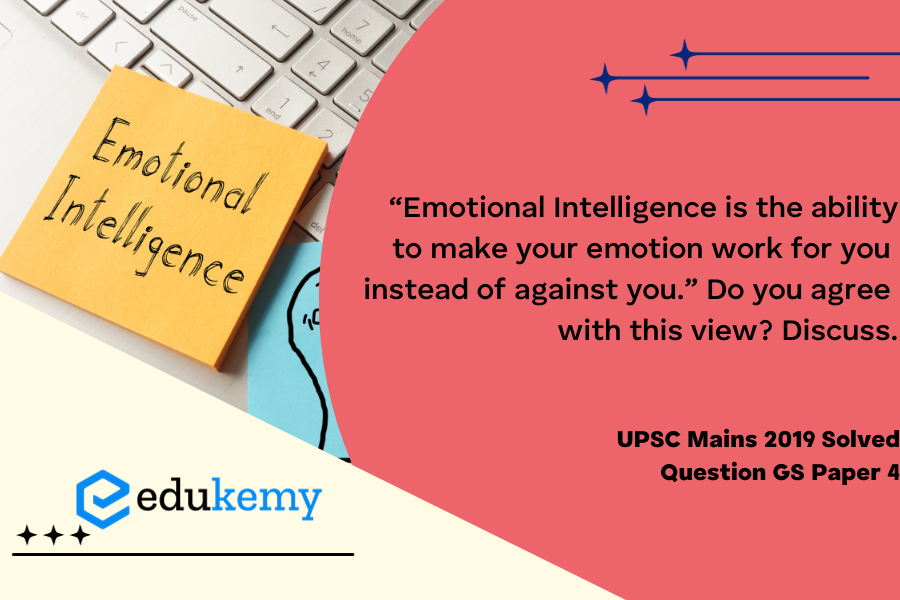Emotional Intelligence, as defined by the statement, underscores the pivotal role of emotions in human behavior and posits that mastering one’s emotions can be transformative. I wholeheartedly agree with this perspective, as it encapsulates the essence of emotional intelligence. Effectively managing emotions allows individuals to harness their emotional responses as valuable tools rather than succumbing to their potentially detrimental effects. By understanding and regulating emotions, individuals can navigate interpersonal relationships with finesse, make sound decisions under pressure, and cultivate a resilient mindset. This view aligns with the notion that emotional intelligence is not about suppressing emotions but harnessing them judiciously for personal and interpersonal benefit. In a world where social interactions and professional success hinge on effective emotional navigation, the ability to channel emotions positively becomes a formidable asset. Consequently, embracing and refining emotional intelligence becomes an integral aspect of personal development, paving the way for a more fulfilling and successful life.
Tag: Emotional intelligence-concepts, and their utilities and application in administration and governance.
Contents
Decoding the Question:
- In the Introduction, define emotional intelligence.
- In Body,
- Discuss the traits of emotionally intelligent leaders.
- Mention the ways to make decisions in favor of our decision-making.
- Conclude, with an opinion.
Answer:
Emotional Intelligence (EI) refers to the ability to understand one’s own emotions and those of others to regulate and manage them and utilize them to execute tasks. It is the basis of the social skills of administrators that contribute to organizational effectiveness.
These sets of skills are imperative to deal with the challenges of administration such as political interference, communication with people, and conflict management.

Traits of emotionally intelligent administrators:
- High Self-regard: Good administrators have high self-regard. They know their strengths and capitalize on those strengths, as well as know their shortcomings and fill the gaps with people with strong skills in such areas.
- Maintain Balance in Life: Good administrators maintain balance in their personal and professional lives. They avoid burning out by managing their time well.
- Inspire a Shared Vision: As an administrator, he/she must convince others that he/she understands what others need and has their best interests at heart. Inspiring a shared vision requires empathy and optimism for it gives our vision a positive and desirable essence. Empathy ensures that we select the right path in terms of what others want to see and hear from us.
- Enable Others to Act: They enable others by fostering collaboration and building trust. Successful administrators share power, delegate well, and do what’s necessary to help others perform better. There is a need for self-regard and interpersonal skills to render others to act. To build successful relationships, one needs the skills to engage and relate to others in a meaningful way.
- Challenge the Process: An emotionally intelligent administrator strives for a good change. He looks for opportunities to grow and also to experiment and take risks. One of the key emotional intelligence skills that are needed to challenge the status quo is flexibility. It is flexible people are more likely to try new things, take risks, and face new challenges without fear.
Emotional Intelligence works in your favor in the following manner:
- It helps in maintaining objectivity while dispensing work
- It leads to efficient and desired outcomes.
- Increases trust among colleagues.
- Reduces stress and any extreme outburst.
- Helps in understanding the state of mind of others.
- Prepares you to deal with unexpected circumstances.
- Emotional Intelligence could help an officer to be motivated and inspire her/his subordinates to execute the given tasks efficiently.
Eg1: If you fought at home just before coming to the office, then there is a strong possibility of a spillover of the bad mood at the workplace in the form of shouting at colleagues or being rude and excessively defensive. But, if you are good at Emotional Intelligence then you’ll calm yourself down, managing your extreme emotions. This will assist you in better discharging your duties to the best of your capabilities. So, this way, you mold your emotions to work for you, rather than letting them create a hindrance for you.
Of course, you also need to do all the usual things you frequently hear about as conducive to objective decision-making, such as avoiding making decisions when you are tired, stressed, or being influenced by non-objective actors. Nevertheless, identifying the root or emotional basis of your feelings will go a long way toward improving your decision-making. Thus, Emotional Intelligence helps in curbing the randomness and extremity of emotions. This further leads to a positive perspective and stable performance rather than creating any hindrance that may go against us.
In case you still have your doubts, contact us on 9811333901.
For UPSC Prelims Resources, Click here
For Daily Updates and Study Material:
Join our Telegram Channel – Edukemy for IAS
- 1. Learn through Videos – here
- 2. Be Exam Ready by Practicing Daily MCQs – here
- 3. Daily Newsletter – Get all your Current Affairs Covered – here
- 4. Mains Answer Writing Practice – here


